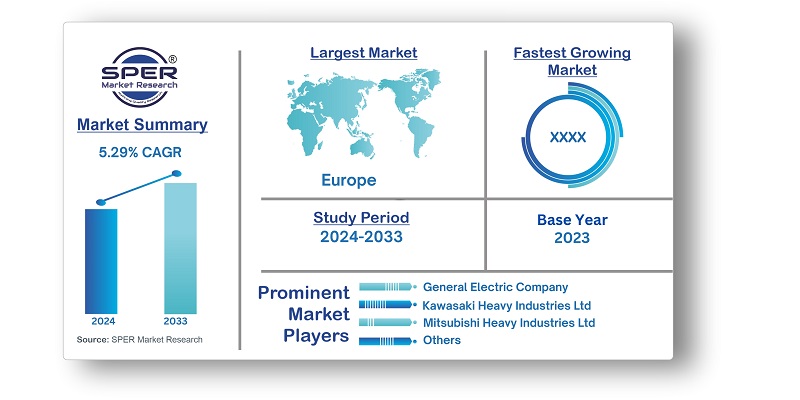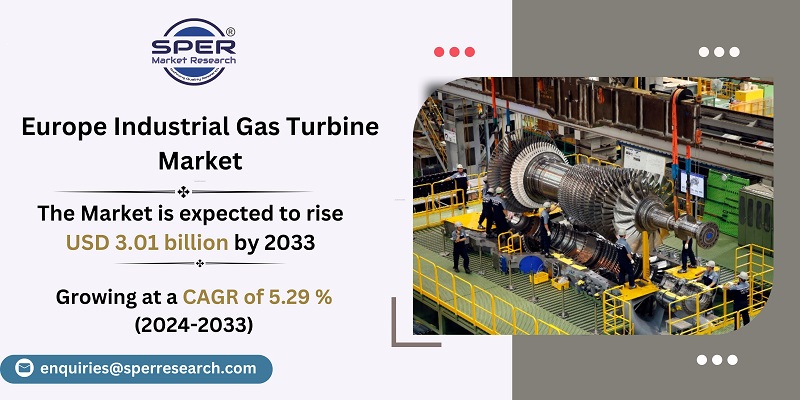
Europe Industrial Gas Turbine Market Growth, Size, Trends, Demand, Revenue and Future Outlook
Europe Industrial Gas Turbine Market Size- By Capacity, By Type, By Application- Regional Outlook, Competitive Strategies and Segment Forecast to 2033
| Published: Apr-2024 | Report ID: POAE2433 | Pages: 1 - 157 | Formats*: |
| Category : Power & Energy | |||


| Report Metric | Details |
| Market size available for years | 2020-2033 |
| Base year considered | 2023 |
| Forecast period | 2024-2033 |
| Segments covered | By Capacity, By Type, By Application |
| Regions covered | UK, France, Germany, Italy, Spain, Rest of Europe |
| Companies Covered | Ansaldo Energia SpA, General Electric Company, Harbin Electric International Company Limited, Kawasaki Heavy Industries Ltd, Man Diesel and Turbo SE, Mitsubishi Heavy Industries Ltd, Siemens AG, Solar Turbines, and others. |
- Power Generation Companies
- Energy Infrastructure Developers
- Manufacturing Industries
- Aviation Industry
- Oil & Gas Companies
- Government Agencies and Regulatory Bodies
- Renewable Energy Developers
- Engineering and Construction Firms
| By Capacity: |
|
| By Type: |
|
| By Application: |
|
- Europe Industrial Gas Turbine Market Size (FY’2024-FY’2033)
- Overview of Europe Industrial Gas Turbine Market
- Segmentation of Europe Industrial Gas Turbine Market By Capacity (1 to 40 MW, 41 to 120 MW, 121 to 300 MW, Above 300 MW)
- Segmentation of Europe Industrial Gas Turbine Market By Type (Combined Cycle, Simple Cycle)
- Segmentation of Europe Industrial Gas Turbine Market By Application (Power, Oil and Gas, Others)
- Expansion Analysis of Europe Industrial Gas Turbine Market
- Problems and Obstacles in Europe Industrial Gas Turbine Market
- Competitive Landscape in the Europe Industrial Gas Turbine Market
- Impact of COVID-19 and Demonetization on Europe Industrial Gas Turbine Market
- Details on Current Investment in Europe Industrial Gas Turbine Market
- Competitive Analysis of Europe Industrial Gas Turbine Market
- Prominent Players in the Europe Industrial Gas Turbine Market
- SWOT Analysis of Europe Industrial Gas Turbine Market
- Europe Industrial Gas Turbine Market Future Outlook and Projections (FY’2024-FY’2033)
- Recommendations from Analyst
1.1. Scope of the report1.2. Market segment analysis
2.1. Research data source2.1.1. Secondary Data2.1.2. Primary Data2.1.3. SPER’s internal database2.1.4. Premium insight from KOL’s2.2. Market size estimation2.2.1. Top-down and Bottom-up approach2.3. Data triangulation
4.1. Driver, Restraint, Opportunity and Challenges analysis4.1.1. Drivers4.1.2. Restraints4.1.3. Opportunities4.1.4. Challenges4.2. COVID-19 Impacts of the Europe Industrial Gas Turbine Market
5.1. SWOT Analysis5.1.1. Strengths5.1.2. Weaknesses5.1.3. Opportunities5.1.4. Threats5.2. PESTEL Analysis5.2.1. Political Landscape5.2.2. Economic Landscape5.2.3. Social Landscape5.2.4. Technological Landscape5.2.5. Environmental Landscape5.2.6. Legal Landscape5.3. PORTER’s Five Forces5.3.1. Bargaining power of suppliers5.3.2. Bargaining power of buyers5.3.3. Threat of Substitute5.3.4. Threat of new entrant5.3.5. Competitive rivalry5.4. Heat Map Analysis
6.1. Europe Industrial Gas Turbine Market Manufacturing Base Distribution, Sales Area, Product Type6.2. Mergers & Acquisitions, Partnerships, Product Launch, and Collaboration in Europe Industrial Gas Turbine Market
7.1. Europe Industrial Gas Turbine Market Size, Share and Forecast, By Capacity, 2020-20267.2. Europe Industrial Gas Turbine Market Size, Share and Forecast, By Capacity, 2027-20337.3. 1 to 40 MW7.4. 41 to 120 MW7.5. 121 to 300 MW7.6. Above 300 MW
8.1. Europe Industrial Gas Turbine Market Size, Share and Forecast, By Type, 2020-20268.2. Europe Industrial Gas Turbine Market Size, Share and Forecast, By Type, 2027-20338.3. Combined Cycle8.4. Simple Cycle
9.1. Europe Industrial Gas Turbine Market Size, Share and Forecast, By Application, 2020-20269.2. Europe Industrial Gas Turbine Market Size, Share and Forecast, By Application, 2027-20339.3. Power9.4. Oil and Gas9.5. Others
10.1. Europe Industrial Gas Turbine Market Size and Market Share
11.1. Europe Industrial Gas Turbine Market Size and Market Share By Region (2020-2026)11.2. Europe Industrial Gas Turbine Market Size and Market Share By Region (2027-2033)11.3. France11.4. Germany11.5. Italy11.6. United Kingdom11.7. Rest of Europe
12.1. Ansaldo Energia SpA12.1.1. Company details12.1.2. Financial outlook12.1.3. Product summary12.1.4. Recent developments12.2. Bharat Heavy Electricals Limited12.2.1. Company details12.2.2. Financial outlook12.2.3. Product summary12.2.4. Recent developments12.3. General Electric Company12.3.1. Company details12.3.2. Financial outlook12.3.3. Product summary12.3.4. Recent developments12.4. Harbin Electric International Company Limited12.4.1. Company details12.4.2. Financial outlook12.4.3. Product summary12.4.4. Recent developments12.5. Kawasaki Heavy Industries Ltd12.5.1. Company details12.5.2. Financial outlook12.5.3. Product summary12.5.4. Recent developments12.6. Man Diesel and Turbo SE12.6.1. Company details12.6.2. Financial outlook12.6.3. Product summary12.6.4. Recent developments12.7. Mitsubishi Heavy Industries Ltd12.7.1. Company details12.7.2. Financial outlook12.7.3. Product summary12.7.4. Recent developments12.8. Siemens AG12.8.1. Company details12.8.2. Financial outlook12.8.3. Product summary12.8.4. Recent developments12.9. Solar Turbines12.9.1. Company details12.9.2. Financial outlook12.9.3. Product summary12.9.4. Recent developments12.10. Others
SPER Market Research’s methodology uses great emphasis on primary research to ensure that the market intelligence insights are up to date, reliable and accurate. Primary interviews are done with players involved in each phase of a supply chain to analyze the market forecasting. The secondary research method is used to help you fully understand how the future markets and the spending patterns look likes.
The report is based on in-depth qualitative and quantitative analysis of the Product Market. The quantitative analysis involves the application of various projection and sampling techniques. The qualitative analysis involves primary interviews, surveys, and vendor briefings. The data gathered as a result of these processes are validated through experts opinion. Our research methodology entails an ideal mixture of primary and secondary initiatives.



Frequently Asked Questions About This Report
PLACE AN ORDER
Year End Discount
Sample Report
Pre-Purchase Inquiry
NEED CUSTOMIZATION?
Request CustomizationCALL OR EMAIL US
100% Secure Payment






Related Reports
Our Global Clients
Our data-driven insights have influenced the strategy of 200+ reputed companies across the globe.




















